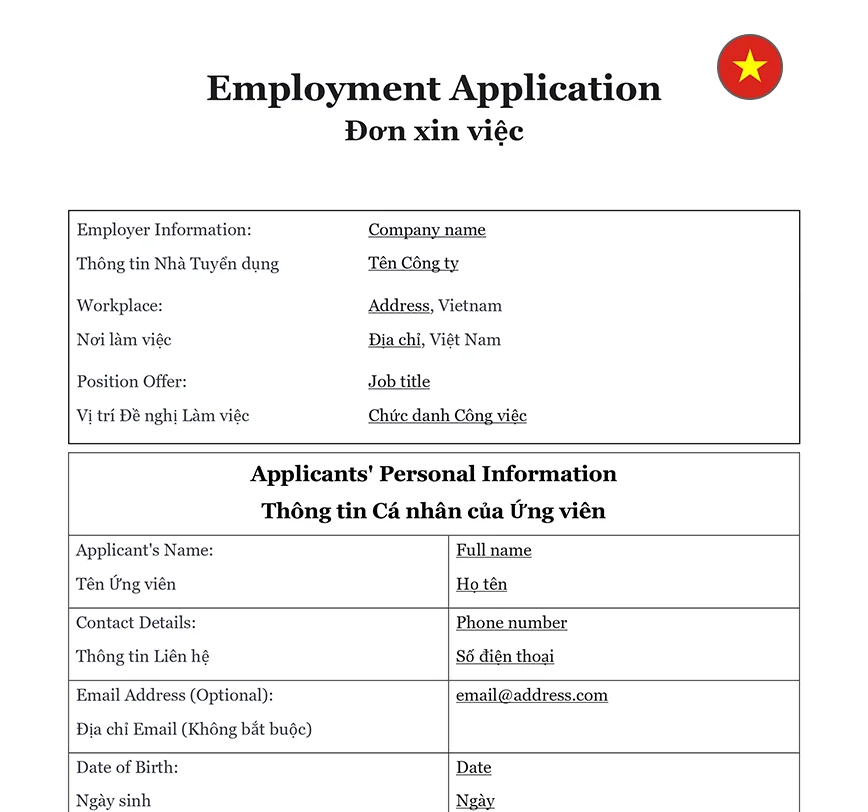Ready to use legal template
Work on without any hassle
Vietnamese-English translation
Ready to use legal template
Work on without any hassle
Vietnamese-English translation
Learn more about Employment Application in Vietnam
An Employment Application is a standardized document used by employers to gather essential information from job applicants, including personal details, qualifications, work history, and references. In Vietnam, using a structured employment application form helps employers ensure consistency in hiring processes, comply with labor regulations, and make informed recruitment decisions. It also protects the company by creating a formal record of the applicant’s representations. A well-designed application form is an important first step in establishing a clear employer-employee relationship. Download our Employment Application Form, available in an easy to edit Word format and drafted by expert in English and Vietnamese, to streamline your hiring process and stay compliant with Vietnamese labor laws.
Table of contents
-
What is an Employment Application?
-
What is included in an Employment Application?
-
What are the different types of Employment Applications?
-
Are there legal requirements in Vietnam?
-
How long should an employer retain Employment Applications after hiring?
-
Are there restrictions on questions that can be asked in Vietnam?
-
Should it include salary expectations in Vietnam?
What is an Employment Application?
An Employment Application serves as a formal document through which individuals express their interest in a job position within a company or organization. This document is meticulously designed to capture comprehensive details about the applicant, typically including sections for personal information, educational background, work experience, and references. Employers rely on the information provided to assess the qualifications and suitability of applicants for the vacant position. By standardizing the data collection process, the Employment Application ensures that all candidates are evaluated based on consistent criteria, facilitating a fair and organized hiring process.
Additionally, an Employment Application often includes specific questions tailored to the job requirements or company policies, further aiding employers in making informed hiring decisions. These questions might address an applicant’s proficiency with certain skills, familiarity with industry standards, or alignment with the company’s values and culture. As a crucial initial step in the recruitment process, the Employment Application not only streamlines the evaluation of potential candidates but also helps in identifying individuals who best fit the organizational needs. By providing a structured format for collecting essential details, it plays a pivotal role in the effective and efficient management of the hiring workflow, ultimately contributing to the selection of the most qualified candidates.
What is included in an Employment Application?
An Employment Application typically includes the following sections:
Personal Information:
Full name, address, contact details (phone number, email).
Educational Background:
Highest level of education completed, schools attended, degrees or certifications obtained.
Work Experience:
Previous employers, dates of employment, job titles, duties/responsibilities, achievements.
References:
Names, relationships, contact information of individuals who can provide a reference.
Skills and Qualifications:
Relevant skills, technical abilities, language proficiency, certifications/licenses.
Availability:
Start date availability, full-time or part-time preference, preferred work schedule.
Authorization and Consent:
Consent for background checks, authorization to contact references, accuracy statement.
What are the different types of Employment Applications?
There are several types of Employment Applications tailored to specific needs or industries:
1. Standard Employment Application
A comprehensive form covering general personal, educational, and work-related information.
2. Industry-Specific Employment Application
Customized forms designed for particular sectors, including healthcare, hospitality, or retail, which may include industry-specific questions or requirements.
3. Seasonal or Temporary Employment Application
Designed for temporary or seasonal positions, focusing on availability and previous temporary work experience.
4. Executive Employment Application
Tailored for high-level positions, often including questions about leadership experience, achievements, and industry-specific competencies.
5. Government Employment Application
Required for applying to government positions, usually more extensive and may involve additional documentation or clearance processes.
6. Internal Employment Application
Used within a company for employees seeking internal job transfers or promotions, typically emphasizing current job performance and skills.
7. Remote or Telecommuting Employment Application
Designed for positions that allow remote work, may include questions about home office setup, internet connection, and communication tools proficiency.
8. Entry-Level Employment Application
Geared towards individuals with limited work experience or those entering the workforce for the first time, focusing on education, skills, and potential.
Are there legal requirements in Vietnam?
Yes, there are specific legal requirements in Vietnam regarding the retention of employment applications and other employment-related documents. According to Vietnamese labor laws and regulations, employers must retain certain personnel records for a defined period to ensure compliance with legal and regulatory obligations. Here are some key points regarding document retention in Vietnam:
| ➤ Retention Period: Employers are generally required to retain employment applications, employment contracts, payroll records, and other personnel files for at least five years after the termination of employment. This is to ensure that the employer has sufficient documentation to address any potential disputes or legal issues. |
| ➤ Types of Documents: The documents that should be retained include, but are not limited to, employment applications, resumes, employment contracts, payroll records, performance evaluations, disciplinary records, and termination records. |
| ➤ Confidentiality and Security: Employers must ensure that all retained documents are kept confidential and stored securely to protect the privacy of employees and comply with data protection regulations. |
| ➤ Regulatory Oversight: Vietnamese authorities, such as the Department of Labor, Invalids, and Social Affairs (DoLISA), may conduct inspections and audits to ensure compliance with labor laws and regulations, including document retention requirements. |




